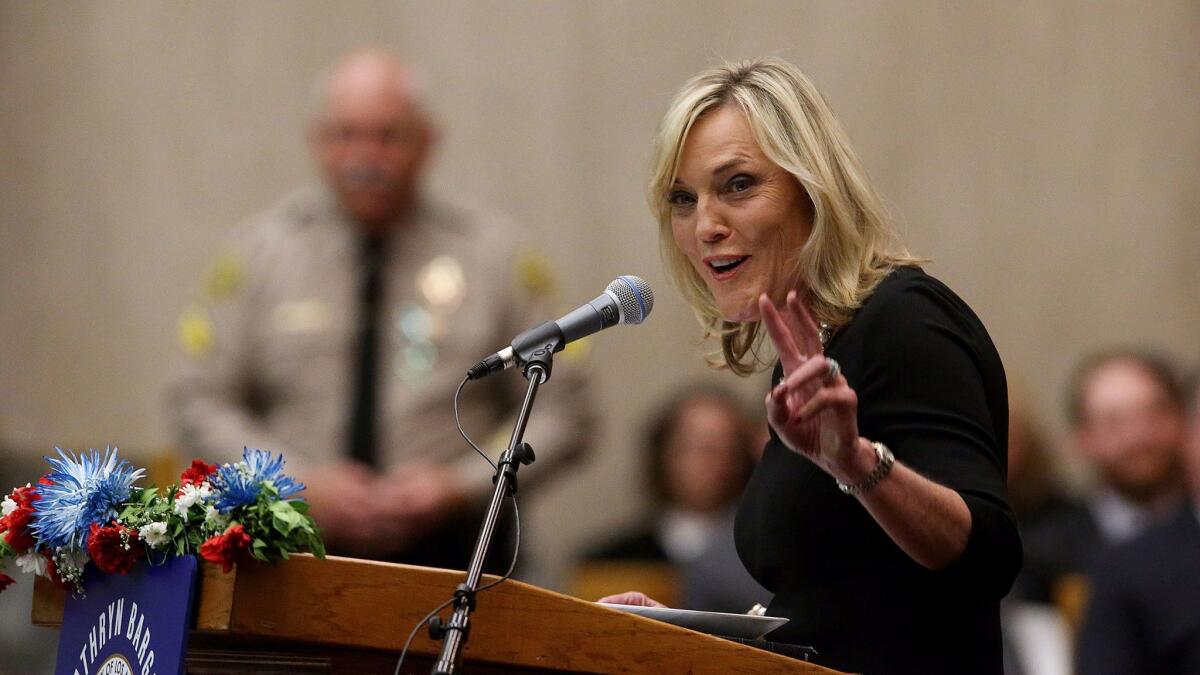L.A. County Supervisor Barger talks high-speed rail, senior services and mental-health programs with Burbank officials

Newly elected Los Angeles County Supervisor Kathryn Barger, who represents the 5th District, met with Burbank City Council members Thursday to talk about how city and county officials can work together on various issues, including senior services, transportation challenges, mental-health programs and homelessness.
“With the 5th District being the largest [in the county], it’s important to collaborate, especially given the challenges facing not only the county, but facing local cities as it relates to funding,” Barger said. “This is my opportunity to collaborate with you all and ensure that I’m not missing something. Because, while I’d like to think that I’ve got my finger on the pulse all the time, there may be things that you all have that are important that I can help you with.”
Judie Wilke, the city’s director of parks, recreation and community services, talked about ways to improve the city’s senior services, especially for those who are home-bound.
Join the conversation on Facebook »
Though the Media City has several well-performing services, such as its home-delivered meals and recreation programs, Wilke said there are other services that seniors would like to see the city provide, such as a daycare program, transportation to places outside of Burbank and assistance with grocery shopping or medical-prescription pick-ups.
“I think we know a lot of what the county does, and we have a wonderful relationship with the county and many of our programs we are providing are funded through the county, but we’re not completely well-versed enough to really think we are giving the best answers to our senior residents that we could,” Wilke said. “Knowing what the county offers will probably help us to minimize duplication, allow Burbank to bridge the gap in missing services and enable Burbank and the county to better coordinate our services to our seniors.”
Councilman Bob Frutos suggestedthe county look into a GPS-tracking program for seniors to help first responders quickly locate those with dementia or Alzheimer’s disease who wander away from their homes.
Barger said the Glendale Police Department is currently developing a program that would track down those with memory issues.
David Kriske, Burbank’s assistant community development director of transportation, talked about transportation issues, mainly Metrolink services, the bus rapid transit corridor from Burbank to Pasadena and improving transportation around the newly proposed Golden State District, which is just east of the Hollywood Burbank Airport.
Barger acknowledged that Metrolink has quality issues, such as a lack of scheduled services and trains breaking down.
“The maintenance on our Metrolink is poor and that’s not really the fault of [Metrolink Chief Executive] Art Leahy, it’s just been neglected,” she said. “We have to do a better job. Otherwise, it’s going to fail.”
Councilman David Gordon brought up the California High-Speed Rail Authority’s project to bring high-speed trains to the state and how Barger felt about it.
Barger said high-speed rail is not appropriate in suburban neighborhoods and highly populated areas, especially the cities in her district. Additionally, she said that the project will have a negative impact on property values.
“From a representative standpoint, I think that the High-Speed Rail Authority has been deaf to the people in the community,” Barger said.
From a representative standpoint, I think that the High-Speed Rail Authority has been deaf to the people in the community.
— Los Angeles County 5th District Supervisor Kathryn Barger
Police Chief Scott LaChasse discussed how his department and other county agencies are dealing with how to transport violent mentally-ill patients, for example, elderly people with dementia.
LaChasse said his department used to have assistance with a county-contracted ambulance to help transport patients to a facility. However, Burbank has been relegated to using its police vehicles to transport patients, which the chief thinks can have detrimental impacts.
“When you’re picking up elderly folks from in front of their house and taking them away in a police car, it does destroy their dignity and leads to a lot of questions,” LaChasse said.
What the police chief would like to see is a program where patients can be taken by an ambulance and brought to a facility where they can receive the help they need.
Barger, who worked on mental-health services for the county while working for her predecessor Michael Antonovich, said she is looking into having urgent care facilities located across the county that can help mentally-ill patients.
Relating to mental health issues is homelessness, which Burbank and nearly every other city in the county is facing on a daily basis. Though the Media City is not as impacted by homelessness as other cities, Patrick Prescott, the city’s community development director, asked Barger how Burbank can secure some funds collected by Measure H to continue aiding the homeless in the city.
The commissioner said the county is forming a group to oversee how the funds are distributed throughout the region. She added that transitional housing and services are vital to helping those who need assistance and want to get their lives back on track.
“In order for Measure H to be a success in about 10 years, which sounds like a long time but is not, we’re looking to the cities to fill in the gaps where we don’t provide the services, such as affordable housing,” Barger said.
anthonyclark.carpio@latimes.com
Twitter: @acocarpio
